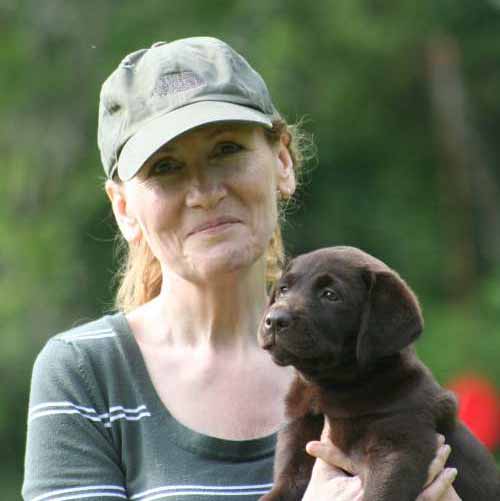 Is your dog lazy about his ‘sits’? Did his recall die? It is very easy to let your dog’s skills become “extinct.”
Is your dog lazy about his ‘sits’? Did his recall die? It is very easy to let your dog’s skills become “extinct.”
But extinction in dog training has nothing to do with dinosaurs, and everything to do with the death of all your hard won progress.
Extinction often lies at the heart of training problems. Let’s find out how you can avoid its effects.
What Is Extinction?
The process of extinction is not restricted to dog training. It’s a word that behavioral scientists use to describe something that we can see happening all around us, in our homes and communities, and in the natural world.
It refers to the death of behavior.
Everything that your dog does comes at a cost, whether simply in terms of the calories it burn to fuel the activity, or in the risks inherent in that activity.
The process of extinction is triggered by a fall in the cost/benefit balance.
If the cost of a behavior outweighs the benefits, then that behavior will die out or become “extinct.” It needs to do this in order that animals can survive in a hazardous world.
If your boss stops paying you, for example, you will stop going to work. If a water hole dries up, animals will stop visiting it when they are thirsty. All living things do what benefits them. They wouldn’t still be here otherwise.
The Power Of Reinforcement
Suppose you teach your dog to jump into the air on the command “leap.” Each time you say “leap” he springs into the air, all four feet off the ground.
And each time this happens you give him a biscuit. The biscuit is reinforcing the leap.
Reinforcement is powerful and it is the only way to teach dogs skills that don’t come naturally to them. But what happens when you stop reinforcing that behavior?
When Reinforcement Stops
Let’s say one day, we simply decide not to reinforce the leaps at all. We simply ask the dog to leap over and over again, with no reinforcement at all. No biscuit. Nothing
At first, an interesting phenomenon occurs. The dog will begin to try harder and harder to win his reward.
He will leap as high as he can, and may offer leaps even when you haven’t asked for them. He will try desperately to provoke the reinforcement he expects based on his past experience with leaping.
We call this behavior an “extinction burst” and it can be observed consistently in all types of animal training. It can be useful too.
It does not, however, last long.
After The Extinction Burst
Animals do not continue to exhibit behaviors that offer no benefit whatsoever, especially if the cost to the animal is quite high.
Leaping is tiring and consumes calories. After a short while, the extinction burst will die down and the leaps will become less enthusiastic.
Sooner, rather than later, you will say, “Leap,” and the dog will just stand there and look at you, as if to say, “Leap yourself,” or, “I think I’ll give it a miss this time” (depending on his personality).
What many people do at this point is repeat the cue with more emphasis. “Leap. Leap!” The dog may respond to this initially, but soon that too will be ignored.
RIP Behavior
Eventually, and quite soon in many cases, any behavior that is not reinforced will die. There are no exceptions.
This is one of the laws of science and nature. You cannot escape it.
If you stop reinforcing your recalls, they will die. If you stop reinforcing your dog for sitting, he will stop obeying your sit cue.
Not the first time, or the second. Probably not the third, but sooner than you think. This is extinction.
What About Variable Rewards Or Fading?
And extinction is not restricted to those that stop rewarding altogether. There is a point at which a behavior stops being worthwhile, even though rewards are sometimes forthcoming.
You’ll only work for a certain salary. If your pay drops below a certain amount, or you have to wait too long between payments, the benefit of working ceases.
If an animal has to walk too far or try too hard to get at a particular food source, he’ll stop trying.
Everything has a benefit /cost balance. In dog training it can be difficult to judge that accurately, so it is better to err on the side of caution and reinforce more frequently than you might think you can get away with.
What About Switching To Other Rewards?
Reinforcement, of course, does not have to be food. It can be all kinds of things, including opportunities to retrieve, games of tug, the chance to play with other dogs, to swim, or simply run around with a toy in his mouth.
What reinforcement must be, therefore, is “reinforcing” to the dog. And this is where so many people fall down, because they offer dogs opportunities that they think ought to be reinforcing, but which are not actually valued by the dog at all.
Avoiding Extinction
To avoid the dreaded extinction kicking in and ruining our training, we need to be honest and objective about what is and is not reinforcing to the dog.
Some of the simple rewards we like to use are actually not reinforcing at all.
Verbal praise is a typical one. Studies have shown that verbal praise alone is not reinforcing to most dogs. So relying on this to keep behaviors strong is only going to end in tears.
Summary
Many times, when dog training goes wrong, it is because the trainer has inadvertently triggered the process of extinction. They have shifted the cost / benefit balance to the point where the dog is no longer motivated to perform that behavior.
This is often mistaken for naughtiness on the dog’s part. Nothing could be further than the truth. This is your dog’s inbuilt survival mechanism in action.
Do yourself and your dog a favor. Pick powerful reinforcers and use them frequently enough to keep behaviors strong.
If your dog is ignoring you, don’t ask yourself if he is being naughty.
Train yourself to ask, “Is my reinforcement actually working?” Or, “Is extinction taking place here?”
Once you have your head around this, you’ll find your training comes on in leaps and bounds.

Free Training Tips
Get Pippa's free dog training tips delivered to your inbox

